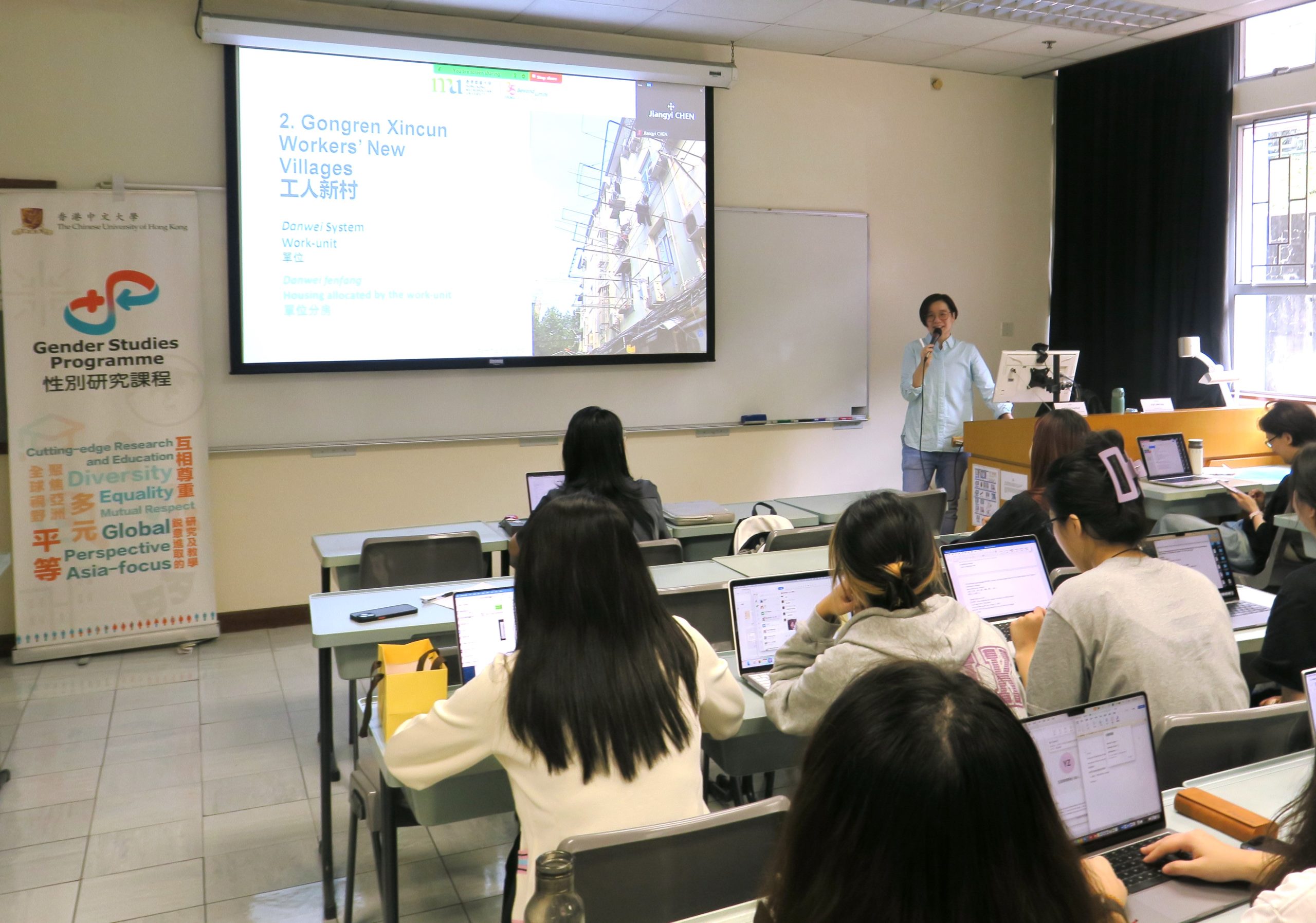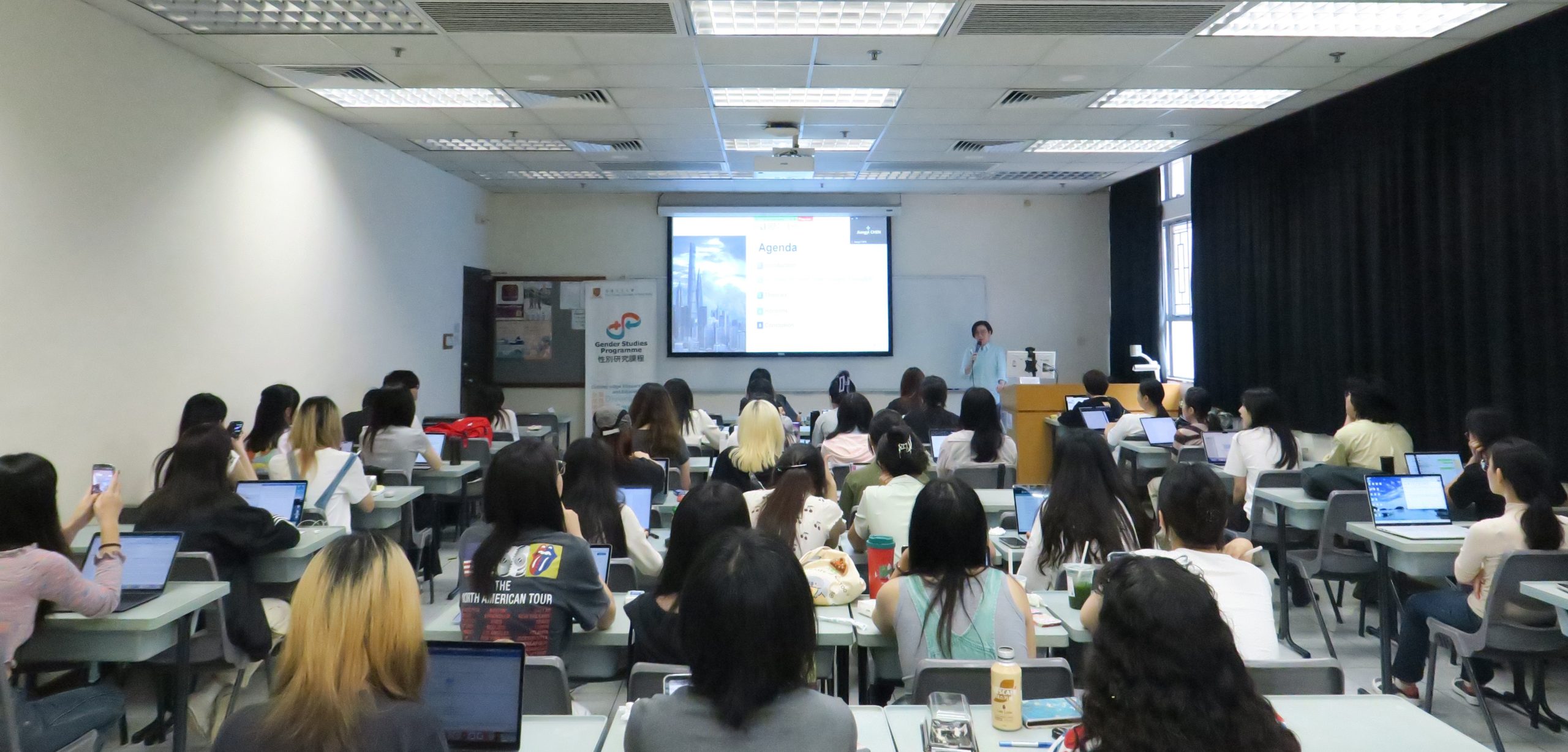In this lecture, Professor Penn Tsz Ting Ip shared her fieldwork in Shanghai, as part of a larger project to understand the lived experiences of lower-working class women and urbanization in the Global South. The talk began by highlighting a common perception that Shanghai has no poverty, contrasting with the realities of pinkun funü (destitute and disadvantaged women) who are still facing deprivation in the city. Amidst rapid urbanization, shifting socioeconomic systems, and changing social norms, these women are navigating everyday lives while creatively reclaiming their rights, spaces, identities, and social relationships.
The fieldwork is situated in Shanghai’s gongren xincun (Workers’ New Villages), originally built between 1949-1995 to provide temporary housing with shared facilities for state-owned enterprise workers. These units were later privatized, allowing residents to purchase their homes, and transforming the urban grassroots way of life from collective to individualized existence. The research mainly employs in-depth and life history interviews to collect the data, while Professor Ip also introduces various feminist approaches to build trust, achieve reciprocity, and include informants in knowledge production, developing rich cultural outputs like a documentary and photo exhibitions with the community.
The study concludes three layers of theoretical contributions: grassroots urbanism, genderscapes, and guanxi, using three horizons from housing units, communities, and the city to develop these concepts. Within the housing units, women face overcrowding, multi-generational living, and conflicts over property inheritance, but also opportunities like compensation for demolition and relocation. At the community level, the gated Workers’ New Villages foster belonging and segregation, with weakening traditional guanxi networks replaced by new support systems like neighborhood committees. In relation to the city, these women experience social immobility due to limited education and employment, while also grappling with displacement from village redevelopment. Besides these tensions, the speaker also mentions how informants creatively use the urban space in an ideology of gratis (mianfei zhuyi), which contrasts the assumed associations between consumerism and urbanization.
Overall, the lecture captures how rapid urbanization, housing reforms, and changing urban policies have reshaped the sociospatial fabric for grassroots women in Shanghai, mapping their everyday struggles and autonomous coping strategies amidst rapid social transformations.
Written by: BI, Yidan
The lecture offered a profound examination of the socio-economic challenges confronting lower working-class women in the context of rapid urbanization. Penn Tsz Ting Ip’s research illuminated the often-overlooked experiences of these women within urban studies, advocating for a framework that recognizes their distinct socio-spatial realities, referred to as “grassrootscapes.”
A particularly influential aspect of the talk was the introduction of “grassrootscapes,” a concept that reorients urban narratives to include the lived experiences of women navigating complex challenges within the transforming landscape of Shanghai. The dual nature of urbanization—as both a force for upliftment and marginalization—resonated deeply. By prioritizing the voices of women who have historically been excluded from academic discourse, this research enriches our understanding of urban dynamics and the intersectionality of gender and class.
The methodologies employed, including in-depth interviews and participatory techniques like photo diaries, provided valuable insights into the lives of these women. Listening to their stories of resilience amidst adversity highlighted the cultural significance of “guanxi,” or social networks, which are fundamental to their support systems. It is both heart-wrenching and inspiring to see how communal ties help these women navigate their struggles.
Additionally, the analysis of housing policies from the socialist era—when women enjoyed greater autonomy—juxtaposed with the challenges posed by later marketization, underscores how policy shifts can deepen gender inequalities. This contrast brings to light the often-unspoken realities faced by many women, emphasizing the need for critical reflection on policy impacts.
Overall, the lecture provoked essential discussions about agency and solidarity among marginalized groups. It instilled a sense of urgency for advocating inclusive policymaking that acknowledges and values the diverse experiences of all community members. This scholarship serves as a vital reminder that a comprehensive understanding of urban landscapes must include the voices of those at the margins. Ultimately, integrating these perspectives can pave the way for a more equitable and compassionate urban future.
Written by: LI, Xiaoyang
此次講座,葉子婷教授分享了她對改革後上海工人新村基層勞動婦女的社會空間關係的研究成果。區別於“上海沒有貧困”的宏大敘事及對中產階級女性的城市研究,該研究聚焦於上海基層女性群體,探討城市化進程及市場改革如何重塑城市空間的生產。工人新村作為1949至1995年間住房政策的核心組成部分,成為研究的切入點,有助於揭示當前上海基層人口結構與社會關係的變遷。
自2017年至2021年間,研究者通過參與式觀察和深度訪談,深入調查了上海X社區的貧困婦女,她們因家庭暴力、癌症疾病、失業、配偶死亡等原因而陷入生活困境。該研究融合了基層城市主義、性別景觀和關係三重理論框架,創新性地提出“基層景觀”概念,從住房單元、社區和城市三個層面多維度考察城市貧困女性的社會空間關係。
在住房單元層面,探討了房屋設施和所有權在城市建設政策下的改變帶來了女性生活環境與親人關係的改變;在社區層面,聚焦於探討社會主義生活理想與工人新村的結合,參與免費的社區活動,獨居老人更看重鄰里之間的幫助;在城市層面,研究揭示了相對於消費主義,基層婦女採取免費主義生活方式及希望通過政府發放的拆遷費來改善生活。
最後,葉子婷教授總結此次研究不僅是對上海基層女性景觀的一次深度探索,更是理解多元都市生活方式的一扇窗戶,它擴大了對基層工人階級婦女如何應對住房市場化問題的關注範圍。通過引入“關係”这一概念,該研究為中國社會的關係網絡的分析提供新穎視角,揭示了全球化背景下城市政策的急劇變化如何驅動社會轉型的復雜圖景。
Written by: TONG, Yuanxin
在此次讲座中,叶子婷教授的研究聚焦在居住在上海工人新村的工人阶级基层妇女群体,通过搭建“基层都市化”、性别景观”与“关系”的理论框架,书写和诠释嵌入在住房单位、社区与城市这三层视界中的微观女性生活,并进一步地将工人阶级基层妇女的生命轨迹与资本主义全球化、中国城市化以及社会制度转型等宏观过程之间的脉络具象化。
该项目以“城市化、性别与发展中国家”为议题进行多地点研究与比较研究。叶教授作为研究者之一,选择上海工人新村作为田野地点,并透过深度访谈、照片日志、日记写作等多种定性方法,探究诸如住房分配、单位制度、改建拆迁等城市政策如何牵涉基层妇女的多样困境,亦关照到妇女在具体困境中的情感和行动。叶教授指出,所采取之方法不仅只为了收集田野材料,也为与研究对象达成互惠和联结。
谈及理论建构,三个贯穿研究的概念“基层都市化”、“性别景观”及“关系”在讲述基层妇女经历时浮现出来。例如商品房改建使厨卫专有化,从而消除公共卫生问题对患癌妇女造成的威胁,其体现了市场化、生活方式与女性经历的环环相扣。此外,当“关系”一词作为应用于分析基层妇女生活的术语时,应辨析与西方“社会资本”概念的内在文化差异性。
讲座以工人新村妇女摄影展览的纪录片结尾,研究者与工人新村的“阿姨”、“妈妈”们的共创过程中自然流露的女性互助、共情,为女权主义方法论关于“如何回馈研究参与者”的问题给出了极具启发性的答案。
Written by: LI, Rongrong


Oct-9-2024-Wed-Seminar.png)


A
A
A
Contact Us